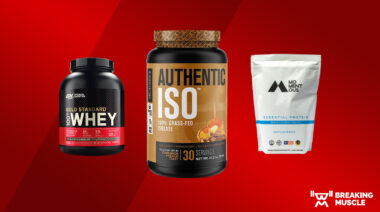To achieve weight loss these days, a lot of people are ramping up their protein intake. Naturally, by weight loss we specifically mean fat loss.
There is strong evidence that upping protein intake is useful for weight loss when done correctly, and that the use of protein powders can help support this process for some people.
To achieve weight loss these days, a lot of people are ramping up their protein intake. Naturally, by weight loss we specifically mean fat loss.
There is strong evidence that upping protein intake is useful for weight loss when done correctly, and that the use of protein powders can help support this process for some people.
Several research trials have shown that a diet that was lower in carbohydrate and higher in protein resulted in a greater weight loss over a shorter period compared with a conventional weight loss diet.1
The studies also showed the higher protein diet helped with fat loss and reduction of waist circumference whilst maintaining lean muscle tissue, which is the ultimate goal for many on a weight loss journey.
Protein powder can be a useful ally for fat loss. (Photo courtesy of of Shutterstock)
Protein’s positive role in fat loss is believed to be due to several factors.
It has an ability to suppress appetite and thereby reduce net energy intake, meaning we feel more satisfied from less food and need to eat less often. Protein is also the most satiating macronutrient over carbohydrate and fat, and appears to affect several body systems to promote satiety.
It affects the gastrointestinal system by slowing gastric emptying, the endocrine system by secreting appetite-supressing hormones, and the nervous system by sending a message to the hypothalamus to suppress hunger.
Protein’s thermic effect on food also plays a key role. When consuming a higher protein diet, the body increases energy expenditure and has a higher resting metabolic rate compared with a lower protein diet.2
Though the case is clear, women are more likely to fall short on their protein intake and men often have a higher requirement for protein, which can sometimes be hard to achieve with diet alone. In this case, a protein powder or a gym supplement can be helpful.
Here’s some golden rules for using protein powders for weight loss if you do go down this route.
- Don’t Add Them On Top Of Your Regular Diet. Adding in extra protein powders to your diet only ends up adding additional unnecessary calories that will make weight or fat loss more difficult.3 Have a protein shake as a great breakfast alternative to help keep total calories down and replace what might normally be a very carbohydrate-rich breakfast.
- Calculate Your Protein Recommendations Properly. Use protein powder to supplement your intake if you find general recommendations hard to meet. The recommendation for a higher protein diet for active adults is at least 0.8-1.2 grams of protein per kilogram of body weight, or around 30% of your total daily calories.4
- Don’t Overdo It. Yes, the ‘too much of a good thing is not good’ rule applies for protein intake too. Very high protein diets can put a strain on the kidneys and may even affect their functioning. Make sure to stick with the protein recommendations and when using protein in your diet, make sure to choose a variety of high quality sources that are low in saturated fat.2
References:
1. Leidy, HJ et al. The role of protein in weight loss and maintenance. Am J Clin Nutr. 2015 Apr 29
2. Pesta, D., Samuel, V. A high-protein diet for reducing body fat: mechanisms and possible caveats. Nutr Metab (Lond). 2014 Nov 19
3. Mayo Clinic. I’m trying to lose weight. Can protein shakes help? March, 2015
4. Australian Sports Commission. Protein. June, 2009






